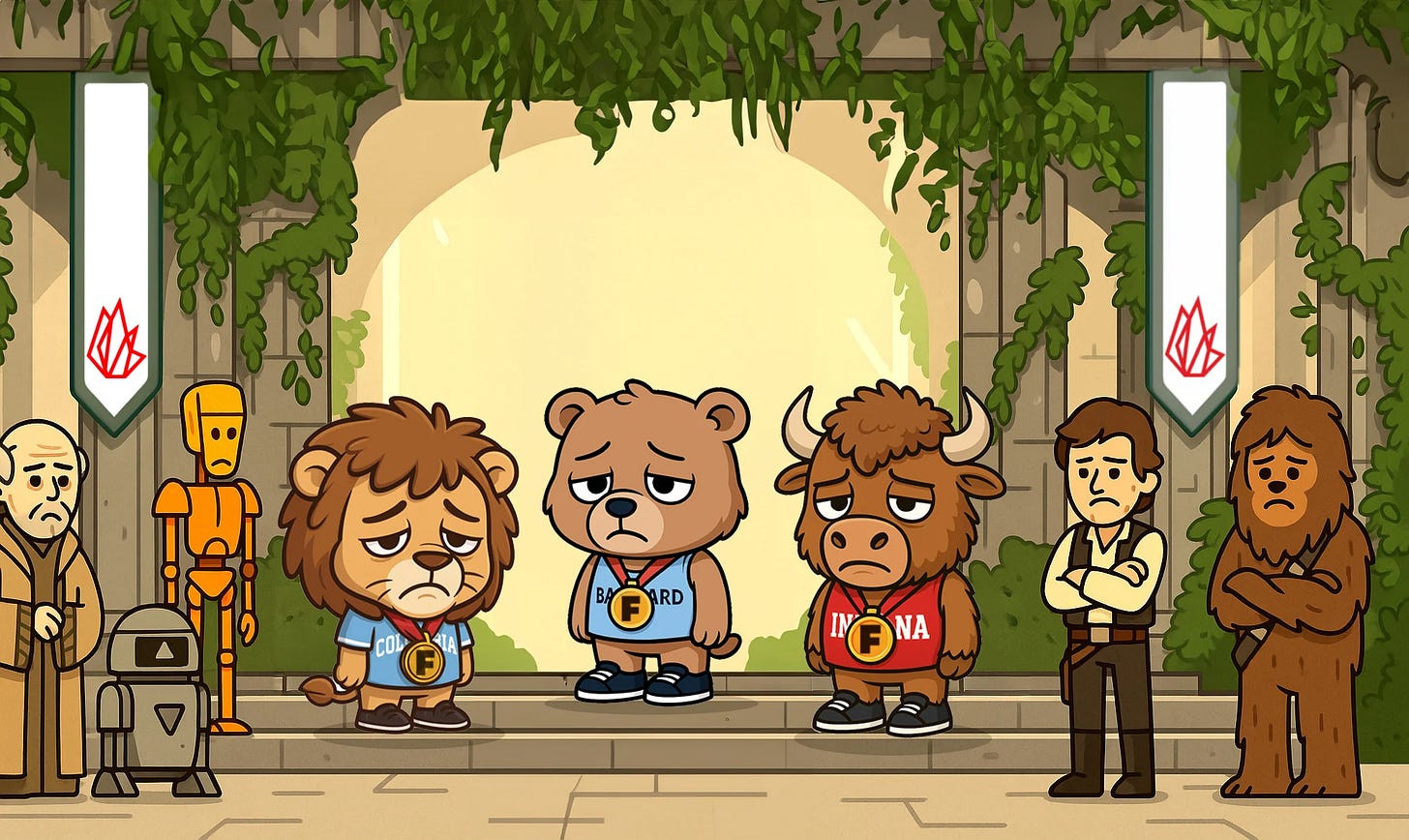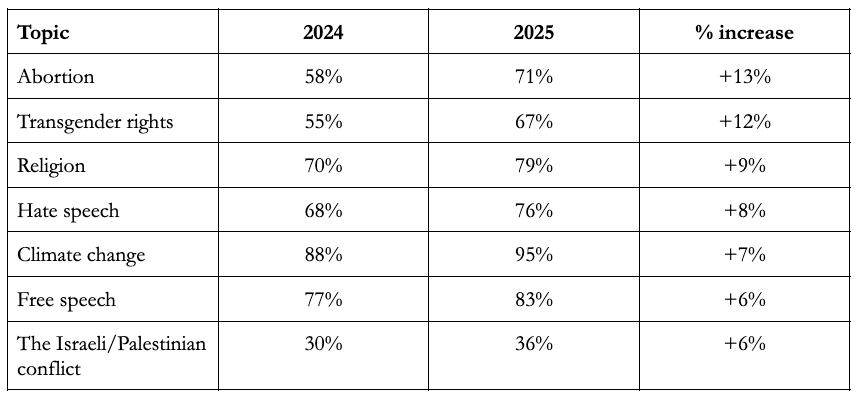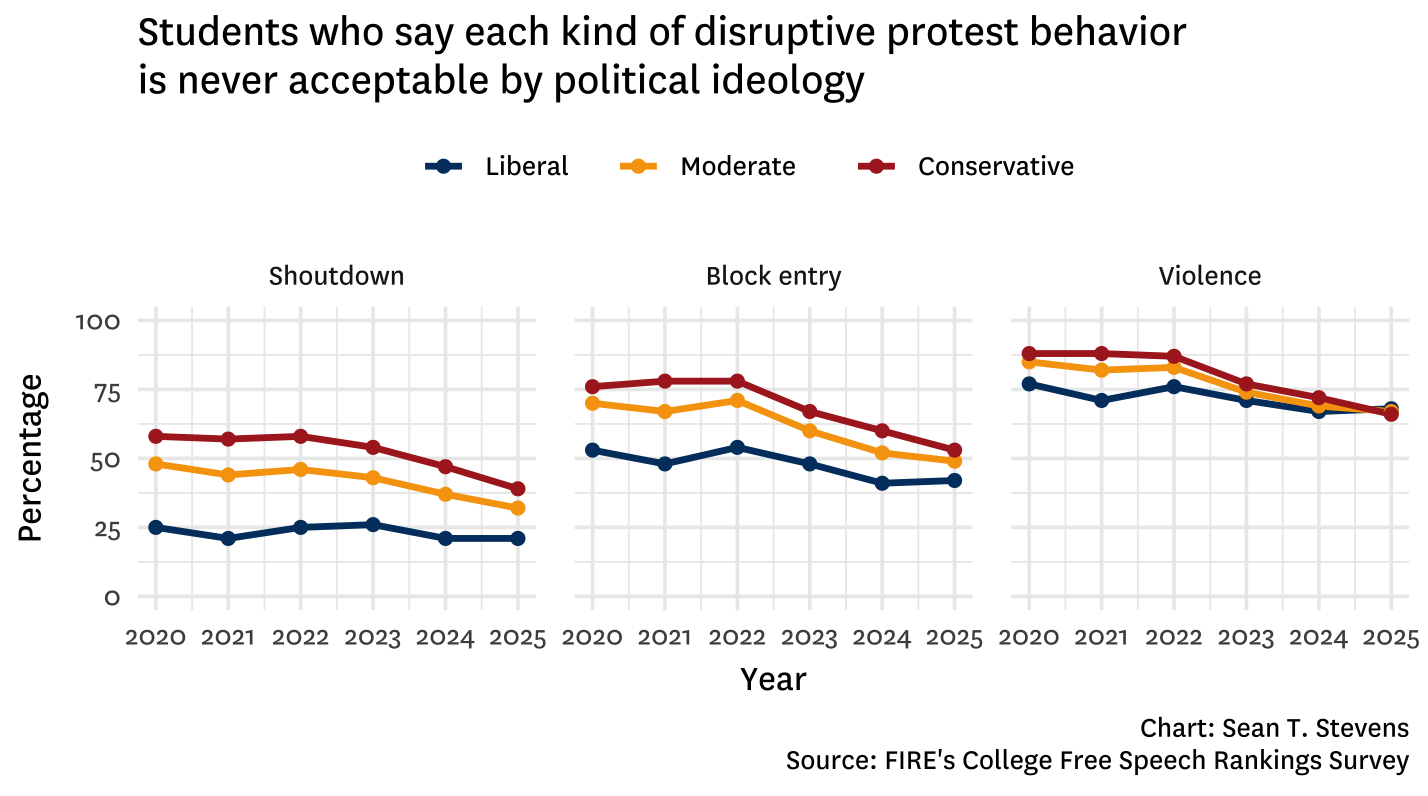Five key takeaways from FIRE’s 2026 College Free Speech Rankings — released today!
Claremont McKenna reclaims the top spot, Barnard and Columbia bring up the rear, and a troubling trend regarding violence continues.
In 2020, FIRE began releasing its annual College Free Speech Rankings, the largest survey of campus free expression ever performed. Each year, we’ve expanded the number of schools included and the number of students surveyed, and this year is no exception: we added six new schools, bringing the total to 257, and surveyed just over 68,500 students.
Released today, these survey responses are combined with information from our databases — which track deplatforming attempts, cancellation efforts targeting students and faculty, and each school’s speech code policies — in order to give a complete picture of the state of free expression on American college campuses, as well as student attitudes towards free speech.
We encourage you to read the full report for yourself and to check out the new and improved rankings website, which has been redesigned to provide even more depth and clarity.
But before you do, here are five key takeaways from this year’s data.
1. Return of the kings: Claremont McKenna, Purdue, and UChicago take top 3
Claremont McKenna College tops this year’s rankings — the second time it has earned this distinction (the first was in 2021). The University of Chicago, ranked third this year, is the only other institution to reach the top spot more than once, having ranked first in 2020 and 2022 before falling out of the top ten for the past two years.
Purdue University ranks second overall in our 2026 rankings, marking its return to the top ten after a two-year absence.
Michigan Technological University ranks fourth and remains a consistent top performer, having ranked first in 2024 and second last year.
Rounding out the top five is the University of Colorado Boulder.
All five of these schools have “green light” ratings from FIRE’s Policy Reform team. They’ve all adopted the Chicago Principles, and all of them — Michigan Tech being the exception — have committed to a stance of institutional neutrality. Schools that adopt both of these policies were awarded bonus points in the rankings for the first time this year.
2. Just desserts: Barnard, Columbia, and Indiana at the bottom
In last year’s rankings report — and in our accompanying Student Encampments Survey Report — we noted a sharp drop in student perceptions of administrative support for free expression at Barnard College and Columbia University, following the start of campus encampment protests.
Barnard ranked last out of 251 schools on the “Administrative Support” component — a measure of how clear it is their administration protects free speech on their campus — while Columbia ranked 247. Both finished in the bottom five overall with Barnard as fifth worst, Columbia second-to-last.
This year, both schools have fallen even further. Barnard ranks dead last in “Administrative Support,” with its score more than four standard deviations below the national average — a margin so extreme it’s akin to scoring a 20 on a test when the average was a 60. It’s also the lowest score ever recorded on this component in the history of the College Free Speech Rankings.
Columbia fares a bit better, with a score nearly two standard deviations higher than Barnard’s, but still well below the national average. Both institutions also land in the bottom five for “Comfort Expressing Ideas,” with Barnard ranked last and Columbia at 254. Barnard additionally ranks in the bottom ten for “Self-Censorship.”
The picture is bleak. Barnard and Columbia students did not react kindly to the administrative action taken in response to last year’s encampment protests, and large swaths of them now have little trust in campus administrators to protect the right to freedom of speech. They also self-censor with alarming frequency out of fear of retribution from someone — whether it be a peer, a faculty member, or an administrator.
These students are not just walking on eggshells; many have become paralyzed with fear. This is happening at one of the most prestigious universities in the country and its affiliated (but independent) women’s college across the street.
Indiana University also earned its low ranking this year. After learning of a planned encampment protest — in a campus area historically known for its 1985 anti-apartheid demonstrations — the university enacted a last-minute policy change. When students moved forward with their protest, administrators responded by calling state police, who posted snipers on the roof of the Student Union building — something the students clearly noticed:
I felt like I could not express my opinion on campus when protests for Israel Palestine conflicts were going on. When we tried to have encampments, our university pointed snipers at students to scare us away. It was dangerous and unsafe.
We had a protest for the liberation of Palestine and the school posted a sniper on top of a building nearby.
The president has called snipers on protestors before.
Suffice it to say, Indiana also ranks in the bottom ten for “Administrative Support,” sitting at 251. The school also performs poorly on “Openness” (255), “Self-Censorship” (246), and “Comfort Expressing Ideas” (227).
3. Leadership matters: Vanderbilt, Dartmouth improve
Vanderbilt University and Dartmouth College both rose significantly in this year’s rankings — to number seven and 35 respectively — due to concerted efforts to improve their standing on FIRE’s Rankings.
Much of Vanderbilt’s improvement can be attributed to its early adoption of the Chicago Principles and a stance of institutional neutrality. The university also revised its remaining “yellow light” policy, earning a “green light” rating from FIRE, which further boosted its score.
Just as importantly, a greater percentage of surveyed Vanderbilt students now say they feel able to engage in open and honest conversations about controversial topics like abortion, climate change, free speech, hate speech, religion, and transgender rights. Notably, more students this year also said the same about the Israeli-Palestinian conflict.
Percentage of Vanderbilt students who say they can have an open and honest conversation about the following topics.
This represents further improvement over last year’s survey results for this question, which themselves were quite impressive. Compared to the year prior, the percentage of Vanderbilt students who said they were able to discuss almost every single topic previously asked about improved by at least seven percentage points. The one exception was Israel/Palestine.
Dartmouth also made meaningful gains in the 2026 Rankings, revising its speech policies to earn a “green light” rating and adopting a formal stance of institutional neutrality — steps that increased its overall score by eight points. In particular, Dartmouth stood out for its performance on measures of political tolerance, ranking sixth on “Tolerance for Controversial Liberal Speakers,” second on “Tolerance for Controversial Conservative Speakers,” and second on “Mean Tolerance.”
To put this in perspective, Dartmouth’s scores on tolerance for both liberal and conservative speakers were more than two standard deviations above the national average.
These improvements were not the result of chance or policy tweaks alone — they reflect the deliberate choices of strong institutional leadership. In both cases, university leaders demonstrated the courage to adopt principles and reforms that support open discourse and intellectual diversity, even when doing so might have been unpopular or challenging. Their efforts show that leadership at the top can shape campus culture in powerful and measurable ways — and that universities willing to prioritize free expression and neutrality can create environments where open inquiry truly thrives.
4. Signs of life? Harvard no longer in the bottom ten
Harvard University has notoriously ranked last the past two years — and it wasn’t even particularly close (although Columbia joined them in earning the “abysmal” label last year).
Harvard still did not do well this year, ranking 245 overall out of 257 schools, but it has made some improvements. Notably, it performed well on most of the political tolerance components incorporated into the rankings, as well as on the “Openness” component (63).
Unfortunately, Harvard still has many issues. It ranks near the bottom on “Administrative Support,” which is surprising since new president Alan Garber has taken a considerably stronger stance on freedom of speech than many of his predecessors. In fact, Garber’s public statements in response to multiple speech controversies at Harvard over the past year mitigated or eliminated penalties that would have impacted its score.
One of these involved Garber himself — he was doused with glitter during a speech by a protester who rushed the stage shouting, “For the baby monkeys, for the animals in the labs, Harvard, shut down the baby monkey labs now!” Garber was briefly escorted offstage by university police, but eventually returned, completed his speech, and emphasized the importance of free expression while referencing the glitter attack.
But these promising developments could be quickly undermined as Harvard’s students and faculty await the outcome of the university’s negotiations with the Trump administration over restoring its federal funding. Many Harvard faculty oppose the negotiations and have concerns that go beyond the restoration of federal funding — including concerns that the university will cede control of faculty hiring and student admission decisions, and that it would share extensive data about students and university employees.
5. Troubling trends in political tolerance
Despite some improvements at certain schools and some promising efforts at others, six years of rankings survey data show that nationwide trends in undergraduate political tolerance are unfortunately worsening overall.
For the first time ever, a majority of students opposed allowing every hypothetical controversial speaker on campus that we asked them about. That’s six in total — three liberals and three conservatives.
Given that on most campuses, the student body tends to be majority liberal, it’s not surprising that students think hypothetical speakers who have said things like “Black Lives Matter is a hate group” or “Transgender people have a mental disorder” should not be allowed on campus. But, over half of students are also opposed to allowing hypothetical speakers on campus who said:
The Catholic Church is a pedophilic institution.
The police are just as racist as the Ku Klux Klan.
Children should be able to transition without parental consent.
These are controversial statements for sure, but they are also variations on things that are heard on most campuses with some frequency. The fact that student attitudes towards even hearing these views expressed on campus doesn’t bode well for the overall speech climate in our institutions of higher education — where open inquiry should be a fundamental virtue.
What is also concerning is that over two-thirds of students think it is acceptable for their peers to shout down a speaker — disrupting a planned talk with the intention of preventing the undesired speech from happening.
In fact, over half of surveyed students say that blocking entry to an event is acceptable, and roughly one-third say the use of violence to stop a campus speech can be justifiable. These percentages have all hit record highs this year.
As we’ve discussed elsewhere, much of the declines in tolerance over the past few years have been due to conservative students becoming less tolerant of controversial speech — including things said by conservatives — and more accepting of their peers disrupting a campus speech or event. This is a marked change from 2020 through 2022, when almost 90% of conservative students said using violence to stop a campus speech was never acceptable; about three-quarters said that blocking entry was not justified; and over half did not approve of shouting down a speaker.
The data this year are stark, and the stakes are higher than ever. Fewer students believe that controversial ideas should be heard on campus, and more are willing to allow others’ to suppress speech through disruption — or even violence — than ever before. These aren’t isolated findings; they represent a troubling, accelerating shift on campuses across the country.
That’s why FIRE’s College Free Speech Rankings matter more than ever. They shine a light on the schools getting it somewhat right — and the ones that are massively falling short — so that students, parents, policymakers, and the public can make informed decisions and demand better from our institutions of higher education.
We invite you to explore the full 2026 College Free Speech Rankings on our newly redesigned website at rankings.thefire.org, where you’ll find detailed profiles for all 257 schools, comparisons across key metrics, and tools for deeper analysis.
Read the data. Share the findings. And join us in defending the freedom to think, speak, and debate, on campus and beyond.
SHOT FOR THE ROAD
I was thrilled to sit down with Peter Slen and C-SPAN’s Book TV at the National Book Festival this past weekend to talk about my latest book, The War On Words: 10 Arguments Against Free Speech—And Why They Fail (co-written with Nadine Strossen.)







It’s “just deserts” not “desserts” because it is what one deserves.
These relative rankings are helpful, but have they been validated against some kind of absolute measure? Maybe by deep interviews with a subset of survey responders. One could hypothesize that the best schools are still lacking a bona fide open free speech atmosphere; they're just not as terrible at those down the list.